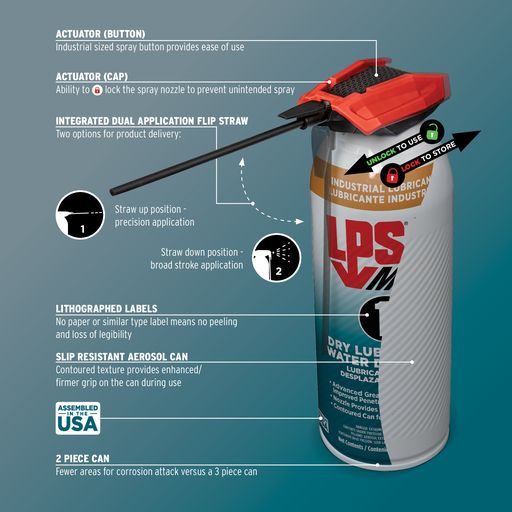How ITW Transforms ‘Pain Points’ Into New Products
ITW Pro Brands delivers products that buoy its customers’ bottom lines by focusing on their pain points and developing solutions.
ITW Pro Brands delivers products that buoy its customers’ bottom lines by focusing on their pain points and developing solutions.
It’s a straightforward strategy, but one that has yielded revolutionary results for manufacturing supplier ITW Pro Brands: Identify the problems impeding operations for factory and machine shop customers, then develop new products that solve them.
Known as customer-back innovation, the approach is part of 110-year-old parent company Illinois Tool Works’ business model, one that the company says has been critical to its longevity and growth.
The strategy’s success is illustrated in ITW’s portfolio of 18,000 patents as well as in Pro Brands products from Rustlick metalworking coolants and LPS MAX electronic cleaners, lubricants and degreasers to LPS DETEX, a line of NSF-approved cleaners, degreasers, lubricants and greases featuring plastic packaging that can be located by metal detectors and X-ray machines.
Used in food processing, LPS DETEX components help plants avoid costly contamination with foreign objects that workers might not otherwise be able to find and retrieve.
LPS DETEX, produced in the company’s Tucker, Ga., facility, is just one payoff from its practice of training its sales team to ask open-ended questions when visiting work sites, learning “details of pain points that maybe the customer doesn’t even recognize immediately,” says Mandy Pack, marketing communications manager.
Understanding those challenges thoroughly is critical to developing solutions, adds Greg Bruce, senior technical marketing manager.
The firm’s metalworking customers, for instance, must constantly balance the conflicting priorities of maximizing output and prolonging tool life as much as possible, since replacement can quickly erode profit margins.
ITW Pro Brands’ Rustlick WS-5050 Water-Soluble Oil, a flood coolant, tackles the dilemma head-on. It’s designed not only to remove chips generated when cutting a workpiece but “to extend the life of the cutting tool itself,” Bruce explains. “You’ve got to apply the right lubricant for the right application. By doing so, you reduce scrap and you extend tool life, which are two big cost savings.”
Another product of customer-back innovation is SCRUBS In-A-Bucket, which consist of a portable bucket full of cleaning wipes strong enough to remove materials from epoxies to oils and grease.
SCRUBS In-A-Bucket cleaning wipes were developed about 30 years ago in response to customers who wanted a quicker way for floor workers to clean their hands. While the time savings involved may sound trivial, they can add up to large reductions in cost, Bruce says.
If a machine shop floor employee earning $20 to $50 an hour takes four breaks a day, walking each time to a sink or washroom several yards away, the time away from the job and “the amount of money that the company is paying for that person not to be productive,” become significant, he explains.
Having effective cleaners close to that employee’s workstation cuts down on both.
“Industry doesn’t want to slow down and change processes unless it’s for an improvement,” Bruce says.
“We have to have products that either fit their processes or improve them by saving them time or adding longevity to their equipment,” he adds. “That’s the whole thrust. Our products aren’t used to make widgets, they’re used to keep the widget machines running.”
The company’s LPS MAX cleaning solvent portfolio, an upgrade of the LPS line, shows that philosophy at work. It addresses pain points from differing state regulations on volatile organic compounds, or VOCs, to the frequent loss of straws that could be attached to spray nozzles to direct their flow more precisely.

Orange Degreaser Low VOC Solvent, one of 11 products available in the LPS MAX lineup, complies with VOC regulations in all 50 states, letting customers avoid the difficulties of tailoring purchases to individual work sites in order to remain in compliance.
VOCs, which are carbon-based compounds that can react with sunlight outdoors or evaporate indoors under normal pressure and temperature, contribute to smog and cause health problems from eye and throat irritation to headaches, nausea and kidney damage.
While the chemicals are regulated by the U.S. Environmental Protection Agency, some states, such as California, apply more rigorous guidelines.
Orange Degreaser “came directly from customers saying, ‘This is a real pain point,’ Bruce says. An array of products on the market that comply with some state regulations but not others “is confusing for distributors,” he says. “It’s a hardship on the customer, specifically if they have multiple locations, to figure out which ones can go where.”
While there’s a widespread perception that environmentally friendly products, particularly cleaners, don’t work as well as their competitors, that’s no longer true, Bruce adds.
“Maybe it was 10 to 12 years ago, but the technologies have changed,” he says. “We have the ability to blend high-quality ingredients from outstanding vendors to make these products that attack the problem and do it in a safer fashion.”
In the case of LPS MAX products, they also work more conveniently: ITW Pro Brands repackaged the line in new cans that include a built-in straw to direct sprays, a lock to prevent accidental discharge and a ridged exterior for easier grip.
“We did marketing studies to determine the major pain points our customers were encountering” before the overhaul, Bruce says. “One study found out one of the things that people in our industry hated the most is losing those little straws.”
The process used in developing LPS MAX is reflective of the company’s overall development strategy: identifying an opportunity, carefully vetting products that might meet the demand and, if they pass muster, bringing them to market.
“Every time there’s a problem, there’s generally a solution,” Bruce says. “If the solution can affect end-users’ bottom lines, which is the reason they had a problem to begin with, then you’ve done a lot to win over a customer.”
What pain points can vendors ease for your business? Tell us in the comments below.